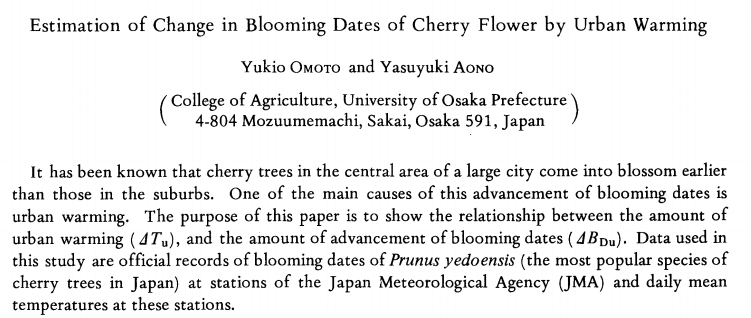This story is being spread around the Internet:
Can the cherry blossom tell us anything about climate change?
Yes, says Dr. Yasuyuki Aono of the Osaka Prefecture University. Since the mid-1990s, Aono and his colleague Yukio Omoto have been unearthing records of cherry blossom festivals in the former capital of Kyoto and nearby towns going back to the 9th century. Using the dates of the festival given in the records, and an equation that calculated the temperature in March of a given year based on when the cherry blossoms flowered, Aono was able to estimate March temperatures in the Kyoto area for the past 1200 years, a full thousand years farther back than most temperature data is available for.
The findings would not please climate change deniers: Aono found that recent flowering days are earlier than any in the past 1200 years.
Here is the abstract of Aono’s most recent paper, which says the exact opposite.
[His work even includes yet another finding of that pesky Medieval Warming Period, which was only a localized "North Atlantic" phenomenon, according to the Warmists. Pity Japan is in the Pacific!]
We investigated documents and diaries from the ninth to the fourteenth centuries to supplement the phenological data series of the flowering of Japanese cherry (Prunus jamasakura) in Kyoto, Japan, to improve and fill gaps in temperature estimates based on previously reported phenological data. We then reconstructed a nearly continuous series of March mean temperatures based on 224 years of cherry flowering data, including 51 years of previously unused data, to clarify springtime climate changes. We also attempted to estimate cherry full-flowering dates from phenological records of other deciduous species, adding further data for 6 years in the tenth and eleventh centuries by using the flowering phenology of Japanese wisteria (Wisteria floribunda). The reconstructed tenth century March mean temperatures were around 7°C, indicating warmer conditions than at present. Temperatures then fell until the 1180s, recovered gradually until the 1310s, and then declined again in the mid-fourteenth century.
Even worse is the fact that Aono blames recent warming in the cities on the Urban Heat Island effect.

Not a hint of truth being presented by the MSM.
SOURCE (See the original for links)
 --
--
No comments:
Post a Comment
All comments containing Chinese characters will not be published as I do not understand them